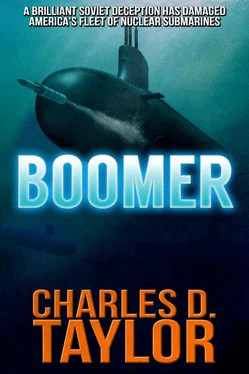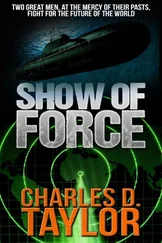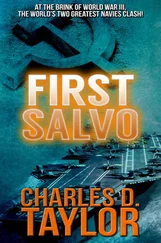Much of their discussion was centered on “what ifs.” What if, by some unexplainable fluke, the Americans learned too early of the loss of their SSBN’s? What if the U.S. decided their SSBN’s were being sunk by Soviet submarines, and what if they decided on a similar course of action by sinking Soviet SSBN’s? What if the U.S. reaction was simply to unleash its remaining triad based on the assumption the USSR was about to do the same? What if the U.S. challenged the Soviet Union publicly — and for some reason could prove their allegations? There were so many “what ifs,” and they had all been considered before. But now, with Pasadena hopefully fulfilling Wayne Newell’s mission, they must anticipate and be ready to react instantly to any what if.
The General Secretary had experienced some anxious moments of introspection the previous evening. The “what if” that concerned him most was what his own reaction would have been if the Americans had perpetrated this action on his country. Though he tried to avoid the unpleasantness, he too often found that he was placing himself in the position of the American president; and, as a result, time and again he experienced a deep feeling of resentment toward the Soviet power structure after all the years of negotiating arms reduction and mutual pacts to avoid armed conflict.
The attempt to eliminate one arm of the U.S. triad had not been his idea. It evolved in the early eighties after it became obvious that the KGB had been immensely successful with their insertion of Wayne Newell. The next logical determination was how best to employ the man. The current plan had been proposed and the details worked out before he’d taken the leadership. Perestroika and glasnost were vital to the evolution of the “new” Soviet Union, but one-upmanship in throw weight never quite reached the back burner. Overwhelming power, currently considered retaliatory rather than aggressive in nature, continued as a military tradition.
As he considered his position the night before, the General Secretary compared himself to President Kennedy and the abortive Bay of Pigs invasion. What an appalling experience that must have been — and to have inherited it from a previous administration! History had already made that one of the most significant gaffes of the twentieth century, and he did not want this operation to match that Cuban abortion.
On the other hand, the world might someday look upon his country’s removal of a threat to world survival as one of the premier contributions to world peace. If by some quirk of fate the Americans could be brought once again to the table to discuss elimination of long-range missiles.… But that was a dream. He had erased the concept from his mind as quickly as possible.
His defense minister, who had been deeply involved in the project from the beginning, had much different ideas. He saw it as a method of conquest. If he’d been given his head, he might have planned on inserting more Wayne Newells, until the entire submarine arm of the American triad was history. But wiser minds, those who were suspicious of the plan initially, prevailed. Many even wondered how it had gotten this far, because they honestly hadn’t settled on what the next step would be. How could they if the Americans had yet to acknowledge anything was wrong? A series of responses had been considered, maybe half a dozen acceptable to all four of them, but not one an absolute until the U.S. reacted.
The other three members in the room that day appeared to be experiencing a heady bout of belligerence. The American eagle had been challenged on his own territory. The gauntlet had been thrown down. To listen to the talk among the three of them, the General Secretary would have thought the U.S. was pleading for its very life. But such was not the case. There hadn’t been the slightest peep from the American eagle.
The Chief of the Main Political Directorate said. “I think we are at the point of asking them if they intend to sue for peace. If not….”
“There is no indication from Washington that they are even aware of the situation,” the General Secretary interrupted, “and I have no reason to believe any of their submarines have been sunk. Each of you bears exactly the same responsibility as myself — preparing for whatever action the United States initiates.”
* * *
Wally Snyder paused for an extra ten seconds before he knocked on the bulkhead outside Dick Makin’s stateroom. Are you absolutely sure you want to do this? he asked himself. He knew the XO had only slept for two hours, but he also realized he might not have the opportunity to talk with him privately again. His idea was a shot in the dark, a lousy bet if Las Vegas was setting the odds, but be couldn’t live with himself if his sixth sense eventually proved correct.
Makin perched on the edge of his bunk and yawned deeply. “I think that the next time you find a few moments to slip into your rack, I’m going to pour cold water down your neck, Wally.” He ended with a halfhearted attempt at a grin, then tried to flatten the remaining fringe of hair around the back of his neck with his hands. He pointed wordlessly at the only chair in the tiny stateroom.
Snyder turned the armless chair around and squatted on it with his arms leaning on the back. Then he looked closely at Makin to make sure the exec was awake.
“I feel like I’ve been dragged through the meat grinder backward. How about slipping down to the wardroom for some coffee?” the XO offered as he stared blankly at the junior officer.
“If you don’t mind, I’d prefer to talk right here. It’ll just take a minute.” Wally’s chin fell on his arms as he stared back at the XO. “It’s just an idea I have, and I figured it would be better to bounce it off you first before it’s mentioned to the captain … if you think it should be.…”
“Go ahead, Wally. Make it good, though.” The XO stretched, surprised at how muscles could tighten up even when they hadn’t been exercised. Then he surprised both of them by yelping when he absentmindedly kicked the chair with his big toe.
Snyder glanced down at the foot and grinned nervously. “Maybe it’s a feeling, sir, nothing absolute. It’s just the communications gear … and everything that’s happened the last few days.” He extended his hands, palms up. “It’s hard to explain exactly, but I’d like to run some emergency tests just to be sure. You know, there are some tests set up with shore radio, even at times like this, so you can make sure everything’s working right.…” His voice softened until it was just a whisper. They were involved in a war. Everything had turned upside down, and here he was about to talk about an experiment — and one that involved breaking radio silence.
“Go on, Wally. What makes you think there’s a problem?”
“Well, we’ve got communications … but since this all started we’re receiving some general message traffic but we’re not hearing anything sent specifically for other boats. The only messages we pick up are directed to Pasadena. Now I know we were told traffic would be restricted on this special net they assigned us if conflict intensified, but it … it just seems odd. Either there’s no other boats capable of copying our broadcast or we’re the only one left out here … or some changes have been made in the emergency op orders that we don’t know about.”
“Say you do the test. How does that work? We’re not supposed to be transmitting. No matter what frequency we copy, we don’t squawk word one. You know, radio silence and all that.”
“It’s pretty simple. It’s designed for an emergency. Just a simple series of letters and numbers that we send so quick no one could ever fix a position on the sending station, or no more than maybe one in a million.” His arms were folded across the top of the chair again and he leaned forward. “Then they answer us with a preplanned series of letters and numbers. It’s a burst transmission, so there’s no problem with interception. If their answer is correct, then I’m wrong. If not, well, then I don’t know what to do next. But it would mean that something’s not kosher and the captain better pay attention to the problem double quick.”
Читать дальше












